Background & Goals | Research Overview | Guides & Toolkits | Research Team | Partner & Funder
Scaling Support for Non-tenure Track STEM Faculty through Learning Communities and Design Teams is a project that aims to help campus teams provide support, particularly related to professional development, to aid the increasing number of non-tenure track faculty (NTTF) who lack the institutional support to provide a quality learning environment for students in STEM.
Background and Goals
Over the past several decades, countless reports have urged for reform of undergraduate STEM education to improve student learning and success for both STEM majors and non-majors. Recent reports call attention to four fundamental problems in undergraduate STEM education:
- Few students choose to be STEM majors.
- Traditionally underrepresented groups have extremely low participation and success rates.
- Graduation rates are low for STEM majors.
- Both STEM and non-STEM majors lack broad skills (e.g., teamwork and writing skills in the former group, quantitative reasoning and analytical thinking in the latter).
To address these issues, these reports show the need for creating more student-centered learning environments that are built on a foundation of conceptual learning goals and use of the most effective research-based teaching, learning, and assessment strategies.
One successful strategy for supporting faculty in adopting evidence-based teaching practices is faculty learning communities (LCs). Through the creation of the Institute, attending campuses will be given resources to set up their own design teams so that they may address the working condition of NTT on their respective campuses.
The Institute aims to help participating campuses achieve two distinct goals. The first is to help campuses create professional LCs (and other forms of professional development) for NTT. The second is to set up a design team focused on addressing the working conditions for NTTF on campus; this team will lead to the substantive policy and practice changes making it possible for NTTF to participate in professional development that supports their use of evidence-based teaching practices.
Research Overview
The major focus of the project is the development of and hosting of the Institute. To achieve these goals, we are conducting research in important areas that contribute to the goals of better supporting NTTF faculty in STEM.
Four original research questions which have not been addressed in any prior research will be the focus of this research:
- Design of LCs: How do campuses design LCs to support NTTF, potentially modifying them from traditional LCs designed for tenure-track faculty?
- Design of LCs: What aspects of LCs do NTTF report helping them improve their teaching and professional practice?
- Impact of LCs: Do NTTF report participation in LCs improve their teaching, professional practice, and ability to support students? If so, in what ways?
- Role: What policy and practice changes are developed by the design teams, and how are their recommendations endorsed and supported by their campuses?
To address these questions, and to inform the design of the Institute, we are initially conducting research to explore existing models of learning communities that successfully engage NTTF. Additionally, we are conducting research into the “design” process for developing interventions in support of NTTF.
To better understand the outcomes/goals related to the Institute, research will also focus on teams that participate in the Institute, following them as they implement learning communities and exploring the policies and products that result, including the LC models they develop to engage STEM NTTF. This research will be conducted through surveys, interviews, and document analysis.
Guides and Toolkits
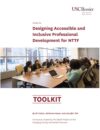
Designing Accessible and Inclusive Professional Development for NTTF Toolkit
KC Culver, Adrianna Kezar, and Jennifer Yeh
Pullias Center for Higher Education (2022)
This toolkit is meant to accompany our report “Designing Accessible and Inclusive Professional Development for NTTF,” which was created as part of the Delphi Project on the Changing Faculty and Student Success. In this report, we found that a variety of professional development opportunities are often necessary to support NTTF, given their needs, interests, and time constraints. More intensive professional development programs, including faculty learning communities, curricular redesign and departmental action teams, certificate programs, and discussion groups, offer NTTF sustained opportunities for learning and interaction with colleagues. These more intensive programs can offer a number of benefits for NTTF: instructional effectiveness, a sense of belonging, institutional integration and knowledge of resources, a professional network, career development and advancement, and opportunities for advocacy and leadership development.
Categories: Delphi Project
delphi project non-tenure-track faculty
Download 1.96 MB 30481 Downloads
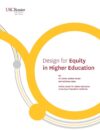
Design for Equity in Higher Education
KC Culver, Jordan Harper, and Adrianna Kezar
Pullias Center for Higher Education (2021)
A customized guide about liberatory design thinking processes that have been tested within college settings to support changes that enhance equity in policies and practices within institutions. This research is based on case studies of several institutions, including focus group interviews with the campus design teams and an analysis of artifacts. Profiles of two campuses that represent the trends of the data across a larger set of campuses is also included.
A companion guide to facilitate implementation of this model is available.
Categories: Delphi Project, Racial Equity, Guides
design thinking policymaking delphi project racial equity
Download 608.34 KB 21880 Downloads
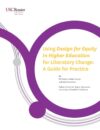
Using Design for Equity in Higher Education for Liberatory Change: A Guide for Practice
KC Culver, Jordan Harper, and Adrianna Kezar
Pullias Center for Higher Education (2021)
This toolkit helps design teams engage in this process of implementing the Design for Equity in Higher Education model, For each phase of the model, this toolkit provides a short description and offers some questions and suggestions to guide practice.
Categories: Delphi Project, Racial Equity, Guides
design thinking policymaking delphi project racial equity
Download 326.93 KB 57245 Downloads
Case Studies
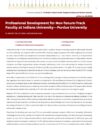
Professional Development for Non-Tenure-Track Faculty at Indiana University—Purdue University
Professional Development, 2021
Jennifer Yeh, KC Culver, and Adrianna Kezar
Pullias Center for Higher Education (2021)
Of the nearly 5,000 faculty employed at Indiana University–Purdue University Indianapolis (IUPUI), 74% are non-tenure-track-faculty (NTTF). Among these NTTF, 45% are full-time and 55% are part-time (adjuncts). IUPUI offers a promotion track for full-time NTTF, providing access (during the spring semester) to the eDossier system that organizes materials/evidence for promotion consideration. All candidates are reviewed by the department/center, school, and at campus level by the Promotion Advisory committee and the Office of the Vice Provost for Faculty and Academic Affairs. Workshops are provided by the school’s Academic Affairs division to help NTTF prepare their dossier for promotional consideration; typically, NTTF who have served in rank for 3 years are encouraged to apply.
Categories: Delphi Project
Professional Development delphi project non-tenure-track faculty
Download 154.78 KB 7899 Downloads
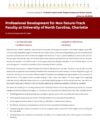
Professional Development for Non-Tenure-Track Faculty at University of North Carolina, Charlotte
Professional Development, 2021
Adrianna Kezar and KC Culver
Pullias Center for Higher Education (2021)
UNC Charlotte's professional development is offered through the Center for Teaching and Learning. Since its inception in 1998, the Center for Teaching and Learning has offered a wealth of professional development opportunities for all instructors at UNC Charlotte. Those opportunities are wide-ranging in topic, scope, and impact. The work ranges from supporting individual faculty with just-in-time solutions to supporting complex programs at the institutional level. Major priorities for Center for Teaching and Learning include providing professional development opportunities to ensure constructive and active learning environments, leveraging the experience and wisdom of faculty leaders to promote teaching excellence, and encouraging innovative research and scholarly publication on teaching and learning.
Categories: Delphi Project
Professional Development delphi project non-tenure-track faculty
Download 157.01 KB 8168 Downloads
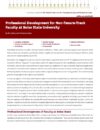
Professional Development for Non-Tenure-Track Faculty at Boise State University
Professional Development, 2021
KC Culver and Adrianna Kezar
Pullias Center for Higher Education (2021)
This case study is focuses on Boise State's work to support adjuncts and begins with an overview of various initiatives in the CTL that are designed to be more accessible to and inclusive of adjuncts, including an adjunct-specific faculty learning community. It then describes professional development offered by the First-Year Writing program and the School of Social Work due to the high percentage of adjunct faculty who teach in these programs. In addition, the brief also describes how those leading these efforts in the CTL and in Social Work are assessing the needs of adjuncts in order to inform the opportunities they offer.
Categories: Delphi Project Case Studies
delphi project non-tenure-track faculty
Download 124.99 KB 8013 Downloads
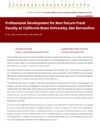
Professional Development for Non-Tenure-Track Faculty at California State University, San Bernardino
Professional Development, 2021
KC Culver, Adrianna Kezar, and Jennifer Yeh
Pullias Center for Higher Education (2021)
The California State University San Bernardino (CSUSB) Faculty Center for Excellence (FEC) provides professional development for faculty, including support for research, teaching, community engagement, and career success. Instructional development is offered through the Teaching Resource Center (TRC), which is led by a faculty member. The faculty member who served as TRC director from 2018–2020 made increasing participation of NTTF a priority. The initiatives at CSUSB represent an amalgamation of approaches to instructional development, with some initiatives developed at the system level, some developed at the campus level, and some through partnerships with outside organizations.
Categories: Delphi Project Case Studies
delphi project non-tenure-track faculty
Download 0.00 KB 6491 Downloads
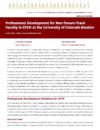
Professional Development for Non-Tenure-Track Faculty in STEM at the University of Colorado Boulder
Professional Development, 2021
KC Culver, Maeve Lee, and Adrianna Kezar
Pullias Center for Higher Education (2021)
The University of Colorado Boulder's Center for STEM Learning (CSL)'s Transforming Education, Supporting Teaching and Learning Excellence (TRESTLE) was a seven- institution project funded by the National Science Foundation from 2015-2020. The TRESTLE project focused on increasing use of research-based instructional practices through embedded expertise within departments to support course redesign, examining how interventions can be scaled at different types of institutions, and the building of communities within and across campuses to increase the impact of course transformation. This case study details the professional development initiatives developed within TRESTLE at CU Boulder, providing an example of how offerings were tailored at one institution in order to meet TRESTLE’s cross-institutional objectives.
Categories: STEM Reform, Delphi Project Case Studies
delphi project non-tenure-track faculty stem reform
Download 105.51 KB 9580 Downloads
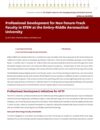
Professional Development for Non-Tenure-Track Faculty in STEM at the Embry-Riddle Aeronautical University
Professional Development, 2021
KC Culver, Adrianna Kezar, and Maeve Lee
Pullias Center for Higher Education (2021)
Embry-Riddle Aeronautical University's Bruce A. Rothwell Center for Teaching and Learning Excellence (RCTLE) provides professional development to the Worldwide campus’ majority adjunct instructor population. The RCTLE utilizes four professional development initiatives specifically geared towards adjuncts: required training for new hires and returning faculty, workshops and just-in-time microlearning, one-to-one consultations with instructional developers, and virtual faculty learning communities (FLC). These initiatives are intended to boost the quality of instruction in online courses, create an inclusive environment for adjuncts, and provide students with better support from faculty who are confident about teaching and use effective practices for learning.
Categories: Delphi Project Case Studies
delphi project non-tenure-track faculty stem reform
Download 102.04 KB 10675 Downloads
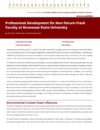
Professional Development for Non-Tenure-Track Faculty at Kennesaw State University
Professional Development, 2021
KC Culver, Maeve Lee, and Adrianna Kezar
Pullias Center for Higher Education (2021)
The Center for Excellence in Teaching and Learning (CETL) at Kennesaw State University (KSU) supports the success of faculty and graduate teaching assistants through institution-wide initiatives focused on career success as well as on instructional development; these opportunities include workshops, one-to-one consultations, and more intensive multi-day programs. In this case study, we begin by discussing the environmental context at the state and institutional levels, as policies at both levels have implications for how professional development is positioned to support the success of NTTF at KSU. We then describe CETL initiatives that have specifically targeted adjunct faculty and outline professional development initiatives employed in two colleges- the College of Science and Mathematics (CSM) and the College of Humanities and Social Sciences (RCHSS).
Categories: Delphi Project Case Studies
delphi project non-tenure-track faculty
Download 126.08 KB 7894 Downloads
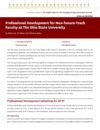
Professional Development for Non-Tenure-Track Faculty at The Ohio State University
Professional Development, 2021
Maeve Lee, KC Culver, and Adrianna Kezar
Pullias Center for Higher Education (2021)
The Ohio State University (OSU) employs nearly 6,000 faculty, about 50% of whom are non-tenure-track faculty (NTTF). Over the past several years, there have been significant changes to the institutional structure and programs related to professional development for faculty. Staff in OSU's University Center for the Advancement of Teaching (UCAT) recognized a need to provide better support that specifically targeted NTTF and a new position was created that was dedicated to NTTF. This case study focuses on NTTF-specific initiatives developed by the coordinator of associated faculty in UCAT.
Categories: Delphi Project Case Studies
delphi project non-tenure-track faculty
Download 102.71 KB 8226 Downloads
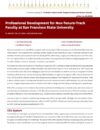
Professional Development for Non-Tenure-Track Faculty at San Francisco State University
Professional Development, 2021
Jennifer Yeh, KC Culver, and Adrianna Kezar
Pullias Center for Higher Education (2021)
San Francisco State University (SFSU)'s Center for Equity and Excellence in Teaching and Learning (CEETL) provides professional development opportunities for faculty that promote equity-minded, innovative, and reflective learning and instructional practices. SFSU offers an example of an institution that provides professional development at multiple levels, with various levels of coordination and collaboration. This case study provides a brief overview of California State University-level initiatives, campus offerings in more localized spaces (e.g., student success program, departmental, and grant-funded efforts), and professional development opportunities offered through CEETL.
Categories: Delphi Project Case Studies
delphi project non-tenure-track faculty stem reform
Download 109.46 KB 8391 Downloads
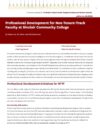
Professional Development for Non-Tenure-Track Faculty at Sinclair Community College
Professional Development, 2021
Maeve Lee, KC Culver, and Adrianna Kezar
Pullias Center for Higher Education (2021)
The Sinclair Community College strives to maintain a ratio of 50% of courses taught by part-time NTTF (adjuncts; up to 12 credit hours per term) and 50% taught by full-time faculty members, who include both full-time NTTF (instructors) and tenure-track/tenured faculty. The institution has a Faculty Senate that offers governance related to full-time faculty. The institution has had a dedicated Center for Teaching and Learning (CTL) for more than a decade, and a robust suite of professional development opportunities are offered. The CTL leverages the institution’s location near the original Lily Conference on College Teaching to engage as many faculty members as possible with the conference itself and the culture of valuing teaching and learning that it fosters.
Categories: Delphi Project Case Studies
delphi project non-tenure-track faculty
Download 95.10 KB 7537 Downloads
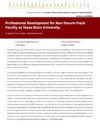
Professional Development for Non-Tenure-Track Faculty at Texas State University
Professional Development, 2021
Jennifer Yeh, KC Culver, and Adrianna Kezar
Pullias Center for Higher Education (2021)
Texas State University (TXST) has earned a “R2: Doctoral Universities- High research activities” Carnegie Classification and continues to follow a committed path towards becoming a premiere research institution. As a result of the school’s shifting focus, the Office of the Provost and VP for Academic Affairs created a full-time position in the Faculty Development office to support the professional development of faculty, with an emphasis on the career development of tenure-track faculty. In recognition of the needs of NTTF, the director is now expanding the professional development programs available to faculty in order to to inspire leadership, collegiality, teaching, research, and creativity using an equity-minded approach.
Categories: STEM Reform, Delphi Project Case Studies, Non-Tenure-Track Faculty (NTTF)
Download 144.64 KB 1283 Downloads
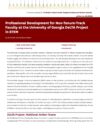
Professional Development for Non-Tenure-Track Faculty at the University of Georgia DeLTA Project in STEM
Professional Development, 2021
KC Culver and Adrianna Kezar
Pullias Center for Higher Education (2021)
The vast majority of faculty across career tracks at the University of Georgia (UGA) are employed full time. UGA works to limit the number of teaching-focused non-tenure-track faculty (NTTF) to make up no more than 20% of total instructional faculty, with some exceptions based on institutional needs. While UGA offers a promotion for NTTF from the rank of lecturer to senior lecturer, all NTTF are employed through annual contracts, regardless of rank or length of employment at UGA. The Scientists Engage in Education Research (SEER) Center at UGA provides a centralized place for interdisciplinary research on improving teaching and learning in STEM disciplines. SEER offers occasional opportunities for professional development of faculty, all of which are open to NTTF.
Categories: STEM Reform, Delphi Project Case Studies
delphi project non-tenure-track faculty stem reform
Download 97.65 KB 9106 Downloads
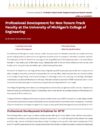
Professional Development for Non-Tenure-Track Faculty at the University of Michigan’s College of Engineering
Professional Development, 2021
KC Culver and Adrianna Kezar
Pullias Center for Higher Education (2021)
The University of Michigan's Center for Research on Learning and Teaching (CRLT) was the first teaching center in the United States, founded in 1962. Nearly 52% of the nearly 6,300 instructional staff on the Ann Arbor campus are non-tenure-track faculty, and in 2004, lecturers unionized to gain collective bargaining rights. College administrators recognized a need to better support NTTF. As a result, the college created a Lecturer Advisory Committee and appointed a faculty member to work part time to coordinate lecturer development. The director of lecturer development is now partnering with CRLT-Engin to create professional development events specifically for NTTF.
Categories: Delphi Project Case Studies
delphi project non-tenure-track faculty
Download 101.75 KB 9524 Downloads
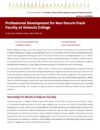
Professional Development for Non-Tenure-Track Faculty at Valencia College
Professional Development, 2021
KC Culver, Adrianna Kezar, and Jennifer Yeh
Pullias Center for Higher Education (2021)
As a learning-focused institution, Valencia College offers a robust, competency-based faculty development program, including a number of opportunities that have been designed specifically for adjuncts, who teach about 40% of Valencia's course sections. Over the past twenty years, the academic community of deans and faculty at Valencia have defined and refine seven essential competencies that promote student learning: assessment as a tool for learning, inclusion and diversity, learning-centered teaching practices, LifeMap (enhancing life skills through disciplinary learning), outcomes-based practice, professional commitment (demonstrating a commitment to ongoing professional development), and scholarship of teaching and learning (contributing to knowledge of teaching and learning). These competencies guide professional development offerings as well as faculty evaluation practices.
Categories: Delphi Project Case Studies
delphi project non-tenure-track faculty
Download 105.48 KB 7588 Downloads
Research Team

Adrianna Kezar
Principal Investigator
Kelly M. Mack
Principal Investigator
KC Culver
Postdoc Research Assistant
Jordan Harper
Research Assistant
Partner
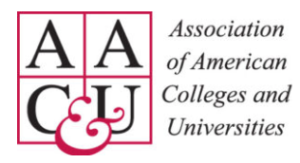
Association of American Colleges and Universities (AAC&U) is the leading national association dedicated to advancing the vitality and public standing of liberal education by making quality and equity the foundations for excellence in undergraduate education in service to democracy. Its members are committed to extending the advantages of a liberal education to all students, regardless of academic specialization or intended career. Founded in 1915, AAC&U now comprises 1,400 member institutions—including accredited public and private colleges, community colleges, research universities, and comprehensive universities of every type and size.
Funder
 This project is funded from the Improving Undergraduate STEM Education program within the Department of Undergraduate Education of the National Science Foundation, under Grant No. NSF DUE-1914784.
This project is funded from the Improving Undergraduate STEM Education program within the Department of Undergraduate Education of the National Science Foundation, under Grant No. NSF DUE-1914784.